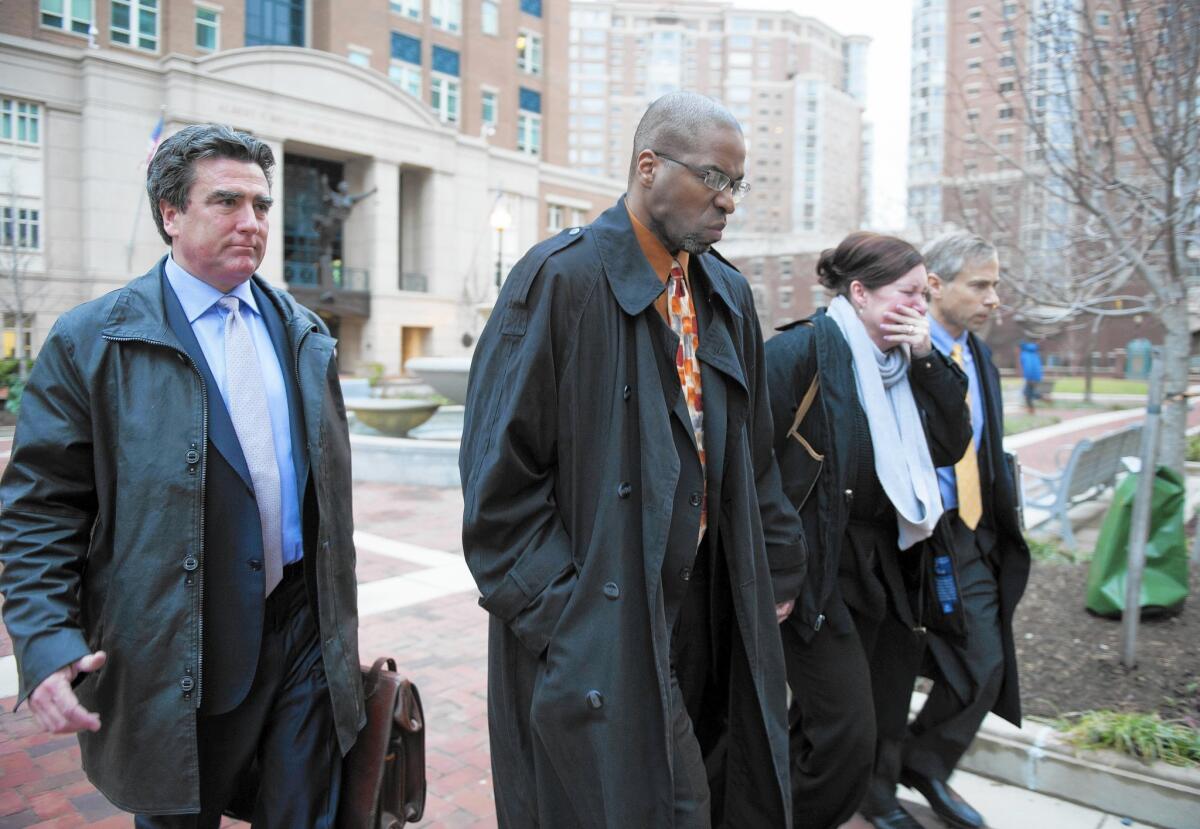Ex-CIA officer gets 42-month sentence for leaking secrets to reporter

Jeffrey A. Sterling, a former CIA officer, leaves the federal courthouse in Alexandria, Va., in January after he was convicted of leaking confidential information to a reporter.
A former CIA officer has been sentenced to 42 months in prison for telling a reporter secrets of a classified operation aimed at sabotaging Iran’s nuclear capabilities.
Jeffrey A. Sterling, 47, was convicted in January of leaking details of the potential operation to New York Times reporter James Risen, who used some of those details in his 2006 book “State of War.”
------------
FOR THE RECORD, 1:49 p.m.: An earlier version of this story called Jeffrey A. Sterling a former CIA agent. He is a former CIA officer.
------------
Sterling was convicted in January of seven counts of unauthorized disclosure of national defense information, one count of unauthorized conveyance of government property and one count of obstruction of justice, court records show. He will be jailed at a federal prison near St. Louis, records show.
The sentence was far shorter than federal prosecutors requested.
Prosecutors had asked the judge to sentence Sterling to a minimum of 20 years in prison. “The defendant breached his solemn oath to the United States, and, in doing so, hobbled one of this country’s few options to undermine the Iranian nuclear weapons program,” prosecutors wrote in the 24-page filing.
Sterling’s attorney, Edward McMahon, told the Los Angeles Times that although he still believes his client is innocent, he was relieved to see the judge reject the government’s call for a lengthy sentence.
“We’ll keep fighting for him, but we’re also very grateful that the judge showed him mercy in imposing a fair sentence on him,” McMahon said.
In his book, Risen described the mission as a botched operation that could have ended with Iran obtaining valuable nuclear information. Federal prosecutors have argued that Sterling’s leaks to Risen endangered lives.
Sterling, who joined the CIA in 1992 and oversaw operations in Iran, was assigned to direct the plot, in which a former Russian nuclear engineer known only as Merlin was to provide Iranian officials with intentionally flawed schematics for nuclear components to be used in their uranium enrichment program.
The case garnered national attention after prosecutors tried to make Risen reveal Sterling as the source of the information. Risen fought the court order all the way to the Supreme Court, where he eventually lost.
But then-Atty. Gen. Eric H. Holder Jr. declined to force Risen to give up his source or threaten the veteran reporter with contempt charges, under mounting criticism about the Obama administration’s treatment of reporters and other allegations of federal agencies spying on the press in recent years.
McMahon said he plans to appeal, but he noted that the wealth of classified information tied to the case will make the appellate process extremely complex.
Follow @JamesQueallyLAT for breaking news
More to Read
Sign up for Essential California
The most important California stories and recommendations in your inbox every morning.
You may occasionally receive promotional content from the Los Angeles Times.











